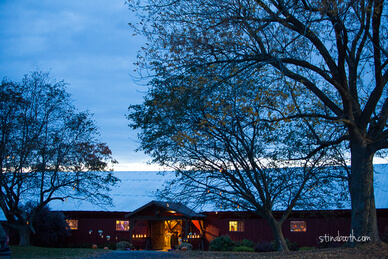Planning to rewrite Land Use Regulations over Old Lantern squabble

The public hearing scheduled before the Selectboard on March 20 to receive public comments on a proposed amendment to the Town’s Land Use Regulations (LUR) concerning The Old Lantern was a model of civility and community involvement. As the attorney for the neighbors, Jim Dumont, said, “Chairman Morrison ran a good and thoughtful meeting.” In the end, both parties seemed pleased with the decision by the board to, “Send back to the Planning Commission to further define and redefine the language for an event facility and language in the petition in a timely manner.”
Lane Morrison, the Chair of the Selectboard, further noted that, “It’s for them (the Planning Commission) to decide. I would think that it’s precedent setting … it’s the grandfathered nature of The Old Lantern, yet it has got to be generic enough to handle future event facilities. So, it’ll be a combination that recognizes both. That’s what the challenge is.”
Roland and Lisa Gaujac, owners of The Old Lantern, stated that their intention in raising a petition calling for changes in the LUR was to obtain a “town-wide vote on whether to change the current zoning in the West Charlotte Village District to allow ‘event facilities,’ such as The Old Lantern, to be counted as an ‘Allowed Use’ in that district.” The Planning Commission and Zoning Board of Adjustment both expressed reservations, particularly to the term “Allowed by Right.” In their eyes, it left open the possibility for any number of undesirable changes to be made without the need to apply for a permitting review. According to the Gaujacs, in a document submitted to the Selectboard, the objective of the petition was to limit continuing legal challenges to their operation by “making the use of the Old Lantern an allowed use and not a pre-existing, non-complying use.”
As was explained outside the meeting by Ms. Gaujac, the State had required The Old Lantern to modify their kitchen and fire suppression facilities else their operation would be closed down. The State characterizes The Old Lantern as an event facility for which certain restrictions must be met for safe operation. Because there is no definition of “event facility” for an allowed use in the current LUR, The Old Lantern would be forced to request a new permit for a non-conforming operation which by virtue of its residential location would be difficult, if not impossible. In a way, it is a Catch 22.
Because of the concerns about expansion or other undesirable alterations or improvements, the Gaujacs in their document noted above, have offered to work with all parties to amend the LUR Table 2.1 (B) – Allowed by Right Use. The amendment would change the wording to require conditional use approval for any non-existing event facility or “any substantial physical improvement or alteration to any existing structure or to a parcel of land currently used as an existing event facility.”
Many of the neighbors’ complaints about the operation of The Old Lantern centered on what they consider as unacceptable noise levels. Currently the top highest level allowed by the LUR is 70 decibels (DbA). The Gaujacs, in their letter, have offered to negotiate a reduction of the limits down to 65 decibels. There is still a controversy looming about how the measurements need to be taken, over what length of time, and to what level. The very definition of decibels in this case is technically complex and will take serious consideration by the Planning Commission. As it is presently construed, measurement and enforcement of the noise level may be virtually impossible for a small town such as Charlotte.
A further consideration which must be undertaken by the Planning Commission is how to rewrite the LUR in such a way as to allow the current or future Old Lantern owners to enjoy a status while not precluding other entities from seeking to open an event facility elsewhere in the town. The term for such an advantage giving one entity an advantage over another is called “spot zoning” and is illegal under State and Federal law. Both parties, and the Planning Commission, will have a real challenge to resolve this legal issue.
The neighbor group, led by Adrian and Alison Woolverton, went to pains to say that they are not seeking to shut The Old Lantern down. They just want it to “operate under some reasonable conditions instead of no conditions at all.” At the end of the 51-minute meeting, the feeling in the room was one of optimism, something rare in these days of political uncertainty.

